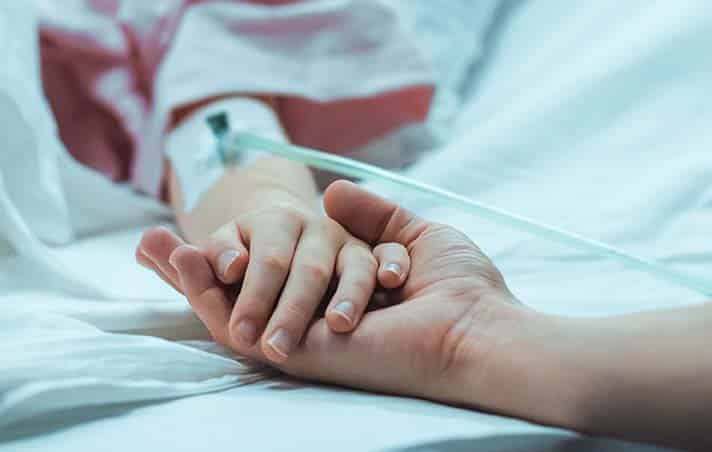A pivotal clinical trial to look at repurposing the UK-licensed medicine, deferiprone, for patients with neuroferritinopathy, an ultra-rare genetic disease has launched today. The trial at the University of Cambridge has been funded by LifeArc, a self-funded, non-profit medical research organisation. The trial received approval to proceed from the UK MHRA last month.
Neuroferritinopathy is a progressive and incurable brain disorder caused by changes in a gene that produces a specific protein – ferritin light chain protein. This change leads to the build-up of iron in the brain. The disease usually appears in middle aged adults and causes severe symptoms that impact day-to-day life, eventually resulting in the loss of speech and swallowing. There are currently no effective treatments.
This new, randomised placebo-controlled, trial – DefINe – will be led by Professor Patrick Chinnery and his team at the University of Cambridge. It aims to stop the progression of the disease by reducing the iron accumulation in the brain with an existing drug called deferiprone. Deferiprone is an affordable oral tablet that is already licensed for use in the UK to reduce iron levels in blood conditions like thalassemia. If successful, the trial could also open the possibility of deferiprone being used for other neurodegenerative conditions linked with build-up of iron in the brain.
Neuroferritinopathy affects approximately 100 patients worldwide. Initial discovery of the condition came when a surprising number of individuals, found to live in the Lake District in Cumbria experienced similar symptoms with a series of incorrect diagnoses. Research into the ancestry of these families by Professor John Burn, a clinical geneticist at Newcastle Hospitals NHS Foundation Trust, discovered the genetic commonality and also found an interesting potential link to the past.
Professor Burn found it was a rare mutation that caused the progression of the condition and almost all the known cases were likely to be descended from the same ancestor. He traced it back to the 18th Century in Cockermouth in Cumbria and families with the surname Fletcher. Professor Burn suggested they could have shared common ancestry with Fletcher Christian (Fletcher being his surname), known for leading the mutiny on the Bounty in April 1789, given he was also from the region. This research included a trip to Tahiti where some of the crew from the fated mutiny settled.
The DefINe trial will involve 40 patients taking the drug for a year, who will undergo state-of-the-art 7T magnetic resonance imaging (MRI) scanning to monitor the iron levels in the brain throughout. The evidence collected will form the basis of an application for licensing in the UK under ‘Exceptional Circumstances’, which is often used for rare conditions where the number of people affected is low. This means, if the trial is successful the drug could go on to benefit all people with the condition more quickly.
LifeArc has contributed £750,000 to the project and Lipomed, a Swiss life sciences company, have generously offered to provide both a cost-effective generic form of deferiprone, Deferiprone Lipomed, and a placebo to the trial – a Gift in Kind worth £250,000.
Samantha Denison, a patient hoping to participate in the trial, said: “It came as such a surprise to be informed of the trial and to learn that we have not been forgotten about. To have the chance to be involved in the trial gives me such hope. If it can help to slow or stop the condition progressing, that would be a huge relief. Just to know that by taking part we could also be helping future generations, is amazing.”
Patrick Chinnery, Trial Lead and Professor of Neurology at the University of Cambridge, Head of the Department of Clinical Neurosciences and Honorary Consultant Neurologist at Cambridge University Hospitals NHS Trust, commented: “Neuroferritinopathy leads to severe disability and currently has no cure. The DefINe trial will show whether we can stop the disease in its tracks by pulling iron out of the brain using a well-known medicine called deferiprone. By funding this study, LifeArc has given the first hope of a treatment for affected families. If successful, the trial will open the possibility of using a similar approach for other neurodegenerative conditions linked to the build-up of iron in the brain, including Parkinson’s disease.”
Dr Catriona Crombie, Head of LifeArc’s Rare Disease Translational Challenge, said: “Drug repurposing trials like this are an increasingly effective way of taking treatments that have already been approved and applying them to new conditions and diseases. This will help unlock new treatments for conditions that currently have few, if any, available. We are committed to supporting pioneering translational research from the lab through to the clinic to provide treatment options for patients who urgently need them. Developing a treatment for neuroferritinopathy is an excellent example of what LifeArc’s Rare Disease Translational Challenge was set up to do and we’re delighted to be supporting it with the University of Cambridge and LipoMed. “
Dr Chantal Manz, Chief Scientific Officer Lipomed AG, Switzerland, said: “Lipomed is very excited to support this promising study concept in patients with neuroferritinopathy, by providing deferiprone 500 mg film-coated tablets and matching placebo tablets. We recognise the unmet clinical need and the potentially significant benefit of this orally active iron chelator. Deferiprone is able to penetrate the blood-brain barrier and may reduce cerebral iron accumulation in patients with this extremely rare, but devastating genetic neurodegenerative disorder, for which no alternative treatments are available.”
References
1 NBIA Disorders Association, October 2020
2 Chinnery, P.F. Neuroferritinopathy. in GeneReviews((R)) (eds. Adam, M.P. et al.) (Seattle (WA), 1993).
Media contact
Hannah Severyn
Head of Media and PR at LifeArc



